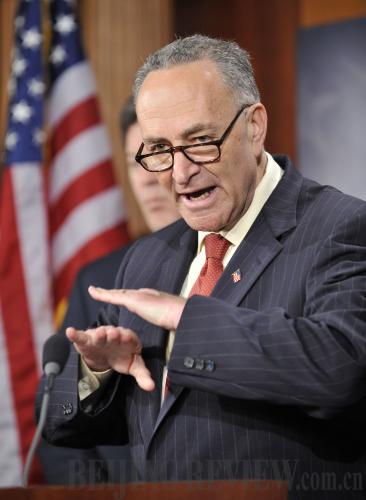|
 |
|
WANG YONG(COURTESY OF WANG YONG) |
April 15 marks a crucial deadline for Sino-U.S. relations—the U.S. Department of Treasury will make its final decision on labeling China as a "currency manipulator" that day. The prospect of a trade war, or even worse, a currency war, between two of the largest economies in the world has cast a shadow over the still unstable global economy.
The United States threatens economic sanctions on China, which makes the exchange rate issue even more complicated.
A serious, cool-headed calculation of the risks must first be thoroughly considered, for if such an economically detrimental situation comes, both China and the United States will lose, leaving the global economy severely damaged.
Scapegoating the yuan
 |
|
ON THE HILL: U.S. Senator Charles Schumer speaks about the renminbi exchange rate on March 16 (XINHUA) |
Why does the United States continue to pressure China to appreciate its currency—the yuan? And what are the chances of this pressure turning into action? U.S. domestic politics and recent diplomatic frictions between the two countries can help answer these questions.
As the U.S. mid-term elections approach, weakening political support for the Democratic party and President Barack Obama is beginning to show. It has become a grim challenge to maintain its current majority after the upcoming election. In order to gain political credit, advisors are obviously turning to a recent political practice in times of crisis, which is to blame China. Toughening the stance against China is conducive to divert popular dissatisfaction about Obama's economic policies; and taking actions on the yuan will boost the hopes of those voters who are complaining about high unemployment.
Fear is proliferating across the United States due to China's rapid economic growth, making it ideal for American politicians to implement policies that "take on" China. To reap immediate benefits, pressuring China's exchange rate was meant to win the support of "swing states" and their representatives in the Congress during the healthcare debate.
The threat of sanctions on Chinese goods could be useful to saving "face" following the recent bilateral diplomatic squabble over the U.S. arms sales to Taiwan and Obama's meeting with the Dalai Lama.
The U.S. Government tends to follow precedents of the past, with Chinese actions labeled "arrogant" or "tough." This friction is related to changes in the relative power position between the two countries in the wake of the global financial crisis, as the United States tries to let China know it is still the No.1.
Harming global economy
Since July 2005, China's currency, also known as renminbi (yuan), has appreciated up to 21 percent. But against American expectations it has not helped to improve the U.S. trade deficit. And China's trade surplus has not reduced.
Clearly, the shaping forces of today's exchange rate have gone far beyond bilateral trade. Doubts persist surrounding the effects the yuan appreciation will have on China's status as the "workshop of the world" or the boost it is expected to give American exports.
| 